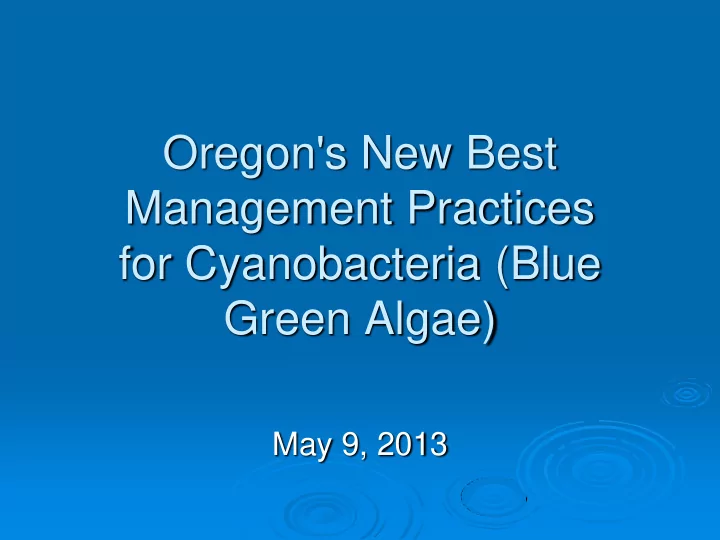

Oregon's New Best Management Practices for Cyanobacteria (Blue Green Algae) May 9, 2013
Cyanobacteria or Blue Green Algae
Toxins Health Effects • Two Primary Types of Toxins • Nuerotoxins (Nervous system) • Hepatotoxins (Liver) Typical Toxins found: • Anatoxin-A • Cylindrospermopsin • Microcystin • Saxitoxin
Hazardous Algal Blooms (HABs)
History of HABs in Oregon Harmful Algae Bloom Surveillance Program Increased monitoring and awareness Main focus on Recreational/Health Advisories Messages touch upon drinking water issues
Education and Outreach Permanent advisory signs Factsheets and poster
2012 Bloom Season Recap http://public.health.oregon.gov/HealthyEnvironments/Recreation/HarmfulAlgae Blooms/Pages/Blue-GreenAlgaeAdvisories.aspx
HABS Health Advisory
Cyanobacteria in the Headlines Don't drink the water: Oregon health officials warn of toxic algae in Dorena Lake (KMTR – 8/2012) Blue-green algae toxins fatal for some dogs (KCBY -8/2012) Blue-green Algae Found In Oregon Pond (KOBI -8/2012)
Oregon’s BMP for HABs Monitoring for HABs Sampling and Testing HABs Toxic Testing Public Notification Treatment Options
BMP Intro Why Water Providers should implement BMP Exhibit 1 – Health Effects of Cyanobacteria Toxins
BMP – Monitoring Identify water body owner Communication & coordination Water provider engagement Exhibit 2 – Algal Bloom Monitoring Guidelines
Sampling and Testing HABs Exhibit 3 – Identifies which BGA species can develop toxins WHO Action Levels – triggers for toxin testing Who should testing blooms for toxins
Water Provider Toxin Testing Weekly raw and finished water testing at intakes Exhibit 3 – Identifies which toxins to test for Link to Labs that test for toxins HABs maps When testing can be terminated
HABs Maps - Potential Impacted Public Water Systems
OHA Drinking Water Acute Toxicity Values for Toxins Cyanotoxin Anatoxin-a Cylindrospermopsin Microcystin Saxitoxin (µg/L) µg/L µg/L (µg/L) Guideline Value 3 1 1 3 If toxin are found in finished water about toxicity values water provider must contact OHA.
Public Notification Exhibit 4 – Talking Points Exhibit 5 – Public Notice Template for finished water exceedances of toxicity values
Treatment Options Reduce Intro of Algal Cells into process Reduce intact algal cells – Prevent Lysing Reduce or Remove Algal Toxins by Oxidation or Adsorption
OHA DWP website OHA Resources Treatment Information Other Resources
New Developments – Toxin Based Monitoring Pros Cons Less chance of having Expensive compared an advisory to cell counts Advisories likely to be More labor intensive shorter in duration for waterbody managers More precise assessment of risk to recreationists & drinking water
Kimberly Swan Water Resource Manager Clackamas River Water Providers 14275 S. Clackamas River Rd. Oregon City, OR 97045 (503) 723-3510 (503) 723-3508 (fax) kims@clackamasproviders.org
Recommend
More recommend